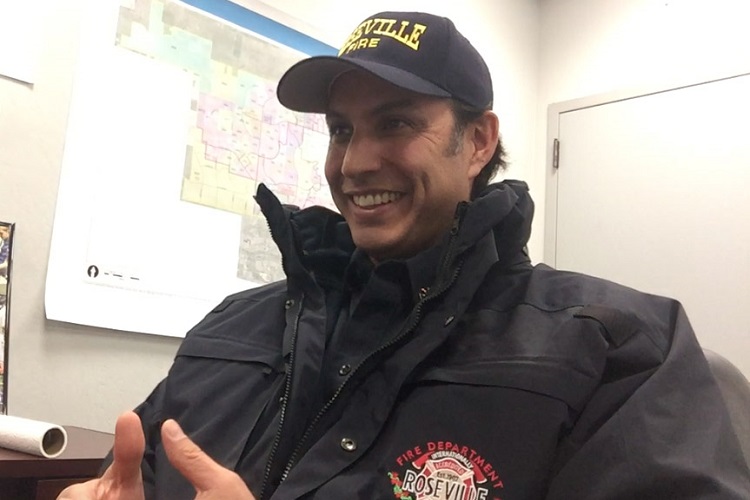

By Shannon McQuaide
This article is a continuation of my interview with Division Chief Dave Dolson of the Roseville (CA) Fire Department near Sacramento, California. Chief Dolson explains why yoga is not a fad and how yoga can align fire departments with their mission.
For part 1, click HERE
Shannon McQuaide: A fire chief from Northern California once told me that he wanted to bring a wellness program like FireFlex Yoga to his department but was concerned that yoga was a fad.
My question for you is, do you think yoga inside the fire service is a fad? And if not, what is the potential impact on the fire culture if more departments implemented yoga practice regularly?
Dave Dolson: No, I don’t think yoga is a fad, and for a few important reasons. First, I’ve found that yoga principles support the core values of being a firefighter. For instance, 22 years ago when I was a young recruit going through a rigorous fire academy, the values of honor, courage, duty, and respect were instilled in me. Today, these values are what keep me balanced. They are my foundation.
But, as important as these values are to me, there have been times in my life when I’m not feeling courageous or have temporarily lost the desire to serve. This is typically an indication that I have given more to my work or to my family than I realistically had to offer. Yoga practice brings me back into balance, reconnecting me with my core values.
A practice that helps me manage my energy is the short check-in we do at the beginning of yoga class. Our teacher will ask the group to take a moment to check and get a sense of how we are doing physically and mentally. If I am feeling good during this check-in, I might use time to send some good vibes to a friend or family member. When I am feeling low or drained, I use this time to take care of myself. What I have learned in yoga is that taking care of myself is an important aspect of performing well at my department and having my home life function well also.
What I try to work on every day and share with my department is the importance of taking care of yourself. That means eating well, resting, and taking breaks so that you can offer up all those wonderful things you have to give. Taking care of yourself allows you to go home safely with everyone else.
SM: I’m glad you brought up the practice of taking a moment to check in at the beginning of class. Although it’s part of my yoga practice, it’s not something that I use regularly with firefighters.
I now understand that providing firefighters with a moment to check in is a process for firefighters to evaluate honestly their physical and emotional state. From this evaluation, they have the opportunity to determine how much energy they’re spending in every part of their lives. Then they can prioritize all the demands on their time and energy. This practice, if done regularly, could prevent some of the burnout and compassion fatigue that is so common among firefighters.
DD: Most people who go into the fire service do so because they want to serve. They are already compassionate people, whether or not the fire department offers an opportunity to display or tap into their compassionate nature. However, over time, especially with firefighters working at particularly busy stations and receiving a gazillion calls, with limited equipment and support, burnout and compassion fatigue can happen.
It’s especially important for firefighters feeling burnout to take a moment and reflect on what brought them into the profession in the first place. For some people, it might be time make a change. Maybe they feel like, “I’ve given all I can give and I don’t have anything left.” For others, through reflection, they might realize that they actually love their profession and they are not sure why they are reacting in a way so contrary to the department’s mission.
Yoga practice is a way of recalibrating our lives life and clarifying our values. In yoga, I have learned how to respond rather than react. When faced with a decision, taking a few breaths allows me to choose a response that aligns with my department’s mission and still honors what I think and feel, rather than having to react to every decision as if it’s an emergency.
SM: How else do departments stand to benefit through self-reflective practices like yoga?
DD: Learning how to be completely frank and honest with ourselves is very beneficial for fire departments, and this comes through yoga practice. Initially it’s the physical limitations you are presented with on your mat. In the beginning, many people can’t touch their toes. Yoga teaches you to just be comfortable with that. If you stay with the practice, over time you will naturally develop physically, and you will become better at yoga. But there will still be limitations. Most of us are not genetically predisposed to be a contortionist. Recognizing and acknowledging our physical limitations is honest.
This skill of engaging in honest intrapersonal rapport can be translated to department meetings and interactions. Debriefings that follow incidents can be glossed over if people are uncomfortable or out of practice acknowledging their limitations, which is unfortunate because there are lessons to be learned.
Following an incident we don’t just pat ourselves on the back and say “great job!” because we put out a fire. Asking ourselves where could we have been safer and more efficient and what we would do differently next time under different circumstances helps each of us grow. And as a department we can evolve.
It’s not only personal limitations we have to acknowledge; it’s also departmental limitations. The City of Roseville has grown tremendously in the past decade. As a result, there are other city departments that have capabilities we need to learn about. Having tunnel vision and thinking that your one department is going to take care of it all can break you. Yoga has a way of letting you know you are part of a bigger system and can call on other resources. We can accomplish more by learning how to work with other city departments.
The other reason yoga is not a fad is because in the end, yoga practice supports being honest, compassionate, and learning to be more empathetic with others–especially ourselves. These are skills that will keep firefighters and departments grounded and resilient.
 Shannon McQuaide is a registered yoga instructor with Yoga Alliance and the founder of the FireFLEX YogaTM program. FireFLEX Yoga was developed through her work with the San Jose (CA) Fire Department, where she continues to lead FireFLEX Yoga classes. She is a certified functional movement trainer and has a master of arts degree in leadership and psychology. Shannon@fireflexyoga.com http://www.fireflexyoga.com.
Shannon McQuaide is a registered yoga instructor with Yoga Alliance and the founder of the FireFLEX YogaTM program. FireFLEX Yoga was developed through her work with the San Jose (CA) Fire Department, where she continues to lead FireFLEX Yoga classes. She is a certified functional movement trainer and has a master of arts degree in leadership and psychology. Shannon@fireflexyoga.com http://www.fireflexyoga.com.

